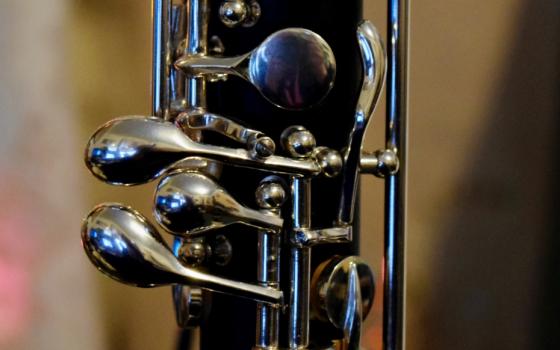How old is too old to learn a musical instrument? That was the question I posed to the oboe master who was helping me find a used instrument.
"Oh, there's no upper limit on ages to learn an instrument. There are persons who've wanted to play the piano or something else for much of their lives but never had the opportunity, for whatever reason. So I'm a believer that you should do what you're inspired to do whenever you're inspired to do it."
I had been renting an oboe from a music store for eight days, but learned that this student-type instrument wasn't for me. The instrument sounded pinched and my playing was not up to pitch. Being in the presence of a master player was a little daunting, but on the rental instrument I just played the scale that I had learned over the past week. I did it with confidence and all the mastery I could muster.
"I just want to play in church," I implored. "I'm not looking to become a concert soloist but instead I want to master the oboe enough to add nicely to the liturgy music group."
The master listened to me play the scale and a few other notes and said, "Well, you certainly sound better than my sixth-graders who started lessons with me months ago. You've only been playing for a week? You should definitely keep going because I'd say you're doing very well. Oh, and I play in church, too, so you'll get there. You'll be playing in church by Christmas 2018."
Oboe master Ellen works for a private double-reed expert who has a workshop of oboes and English horns. He's a dealer for the best oboe brands available, and also has used oboes that have been traded in for new models. It was these used oboes that we were examining.
She had arranged five used oboes on stand-up holders. She inserted her reed in one, played a few scales, removed her reed, and handed me the instrument. I inserted my reed, painstakingly made sure my fingers were in the correct places, and played the notes of that one scale in the best flowing manner I could muster. We did this for all five used oboes. There was one instrument that she liked a lot and even I could tell that it seemed to play better for me, so we eliminated the others and focused on this finalist.
I played my rental oboe, then the finalist oboe. There was just no comparison in the sound: The finalist was sweeter, clearer and easier to play. She got out her tuner, had me play, and I was now on pitch. We both looked at each other — me with wide eyes — and nodded to each other. Even I could tell a tremendous difference between my rental, a cheaper plastic student model, and the finalist.
The finalist was a 30-year old Grenadilla wood Rigoutat oboe made in Paris. Whoever owned it broke it in very well; it was well-used, well-cared-for and the keys played like silk. A compelling feature is that it had several additional bridge keys that progressing oboists need — not found on the student model.
This instrument came in a red leather case with a three-space reed holder folio. And this oboe was even in my price range. Sold.
Ellen was overjoyed for me, gave a few tips about a method book, about safeguarding the bridge keys, and taking care of the wood — and I was on my way.
On my drive home, I anticipated practicing and learning on this wonderful instrument. I also thought about my experience of learning the cello, as I also started out on a student model decades ago. I've probably had six different cellos over a lifetime. The very first one was an inexpensive $500 student model. Though I did learn this instrument, it wasn't easy to play, had a scratchy tone, and was varnished with a thick brownish lacquer that muted sound production, making it sound like it was covered by a wet blanket.
The cello I have now is a fabulous one from a luthier in Poland, and has a clear, bright cello tone in all the registers. My first cello was deplorable in comparison and I clearly remember thinking while playing that I must be doing something wrong, since the sound was far from how I thought a cello should sound.
Why do we start young children on string or brass or wind instruments that are the cheapest things we can find? Is it any wonder that kids give up on these in a short time? Adults can't even play them, so why would kids find it satisfying to start out on such low-quality instruments?
Oh yes, there's the reality of instruments getting damaged by the careless way kids handle them, and then those sword fights with violin bows don't help, either. But what if the instrument started off easy to play and the child could actually play that instrument with beginning success? Wouldn't that instill a desire to keep going and to take care of the instrument?
I suggest that children beginning in music should learn on a step two or three musical instrument that plays easily and sounds better. Like my accordion. Unlike my rental oboe and first cello.
As a second-grader in the 1950s, I took music lessons on the accordion. Didn't every kid play the accordion back then? I loved playing it, and the only difference in quality is that a student accordion is a "petite" size compared to the much larger concert-size accordion. My folks didn't hesitate to eliminate the rental and to buy my instrument not long after I started lessons. It was obvious that I was a serious accordion player-to-be. My folks purchased for me a full-size, 120-bass accordion with three keyboard sound variations.
Believe it or not, I still have this same accordion and I still play it for my own enjoyment as well as for various Oktoberfest events. This wonderful accordion is still going strong, 60 years later. It needed a minor repair only once. This instrument was quality from the start and has provided a lifetime of musical accomplishment.
In case you're wondering, the oboe is coming along very well. In fact, I did play in church throughout a Christmas liturgy. The tone of the oboe just soared, lending a haunting yet confident sound, complementing the other instruments and voices. What a thrill to realize that I can now answer, when asked what instruments I play, "I also play the oboe."
Day-to-day ministry can be challenging, but knowing that some cello-ing and oboe-ing await me at home gives me wings.
I heard a conference speaker recently who's a true science guy; in his presentation, he talked about understanding the basics of how something works, like a car or a computer. He said, "Cells grow better when we turn on the music." So if cells like music, that's all the more reason to take this to heart:
- You're never too old to do something you really love;
- Do what gives you joy;
- Stand back and be astounded at how much better life can be.
That's what I'm doing. Would you like to hear an oboe tune? I'm pretty good on "Veni, Emmanuel."
[Nancy Linenkugel is a Sylvania Franciscan sister and chair of the department of Health Services Administration at Xavier University, Cincinnati.]

